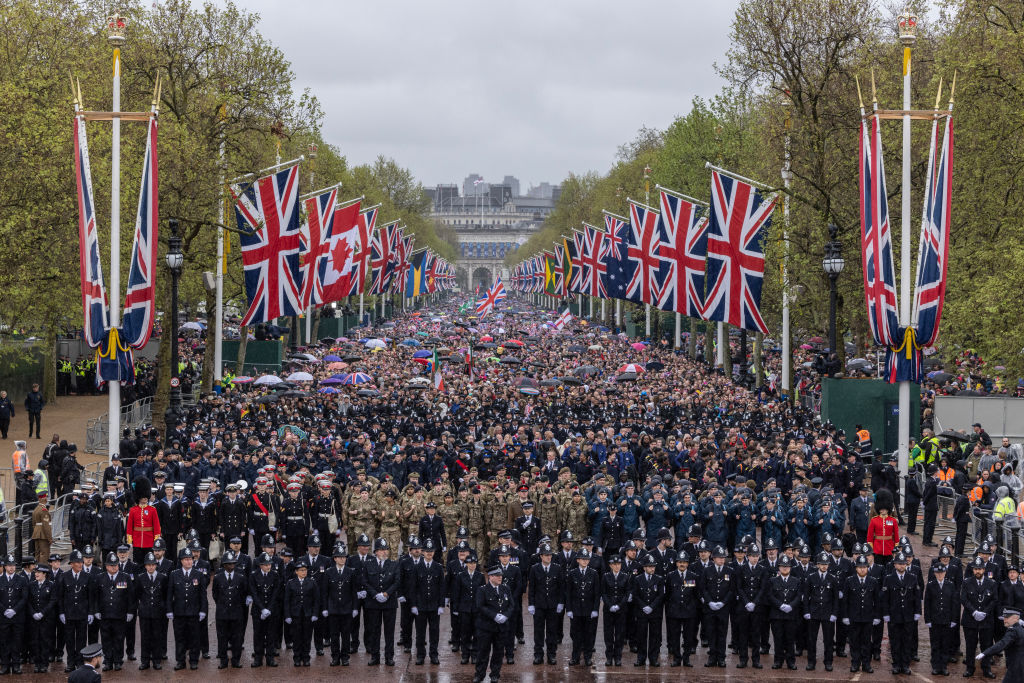‘I am immensely proud of the exceptional work of our officers who prevented criminal disruption, damage and danger destroying such a unique occasion,’ said Sir Mark Rowley, the Metropolitan Police Commissioner.
He was talking of course about the coronation amid the controversy that has swirled around the Met since reports emerged that people were wrongfully arrested as part of its operation in central London last Saturday, appropriately codenamed ‘Golden Orb’.
Frankly, the Met will regard the arrest of a handful of innocent people and a row about protestors’ rights as a price worth paying
Among them were six members of the anti-Monarchy group, Republic, mistakenly suspected of having equipment for a ‘lock on’ style demonstration. In fact, the items were straps to secure placards. The six were told they would not be charged, but only after spending the entire day in police cells.
‘While it is unfortunate that the six people affected by this were unable to join the hundreds of peaceful protestors, I support the officers’ actions in this unique fast moving operational context,’ said Sir Mark, who cited ‘rapidly developing’ and ‘reliable’ intelligence that some individuals were intent on causing ‘serious disruption and criminality’.
His explanation was understandable. The force had to find a balance between the campaigners’ rights to speak out (‘We do everything we can to respect protest’, said the Commissioner) and the rights of those taking part in a ‘once in a generation event’. Given that there were 312 world leaders and dignitaries attending, tens of thousands of people on the streets and many millions watching on television, it is no surprise where the Met decided to draw the line.
Every week the force has to make decisions about its approach and tactics during demonstrations – there were more than 4,000 in the capital last year – and there are often no simple answers. How many people are going to turn up? Will they stick to the area or route agreed? Is there likely to be trouble? How much disruption will there be?
There will be fierce scrutiny if the police come down too heavily, as they did in 2009 when newspaper vendor Ian Tomlinson died after being pushed to the ground by a Met officer during a protest against the G20 summit in the City of London. And there will be stinging criticism if they don’t clamp down hard enough, as there was in April, when Sir Mark was rebuked by Conservative MPs at the Commons Home Affairs Committee over the force’s policing of Just Stop Oil protests in Westminster.
Can you imagine what would have happened if a protester had breached the line of officers guarding the coronation procession, scared the horses or thrown paint at the Royal carriage? Sir Mark would have faced more than just the wrath of MPs like Lee Anderson, James Daly and Tim Loughton. It would have been a resigning matter.
Indeed, the Commissioner acknowledged how high the stakes had been. ‘I am immensely grateful to [the police officers] that I am not currently trying to explain why we failed to prevent the perfect coronation celebration being significantly disrupted or injury or harm to people witnessed on the world stage.’ Frankly, the Met will regard the arrest of a handful of innocent people and a row about protestors’ rights, however uncomfortable it might currently be, as a price worth paying for the occasion to have passed off without incident.
That is not to say that the balance around the right to protest is in the right place. The ink had barely dried on the Police, Crime, Sentencing and Courts Act (PCSC) last year when the government introduced the Public Order Bill. Both significantly extend the powers of the police.
The PCSC Act allows senior officers to place conditions on protests where the noise might result in serious disruption, creates a statutory office of ‘public nuisance’ and increases penalties for obstructing roads. It has already been widely used, with the Met alone making 750 arrests relating to Just Stop Oil protests between October and December – but ministers did not wait to evaluate the Act’s effectiveness or whether further measures were needed before steering the new bill through parliament.
This legislation goes much further. Although offences of obstructing major transport works and interfering with key infrastructure may be seen as sensible and proportionate, the extension of powers to stop and search people for locks, paint and glue risks inflaming tensions among communities which are already over-policed. The introduction of Serious Disruption Prevention Orders (SDPO) – which would permit the courts to ban people from going to specific places and meeting named individuals in order to prevent protest-related offences – are particularly troubling.
Those subject to a SDPO might be required to wear an electronic tag and could be jailed if they breach the terms of an order. If applied to terrorism suspects such restrictions might well be appropriate, but judges will need to exercise the utmost care when being asked to sanction their use for those who might cause ‘serious disruption’ at a protest. The definition of ‘serious disruption’ has been drawn so broadly that it encompasses those whose daily activities are ‘hindered by more than a minor degree’.
It is unlikely that Sir Mark Rowley will ever again have to lead a policing operation for an event of such historic importance as the coronation. But with new powers at the Met’s disposal, he and his officers must work doubly hard to ensure they are not misused – and don’t undermine our cherished right to protest.






Comments